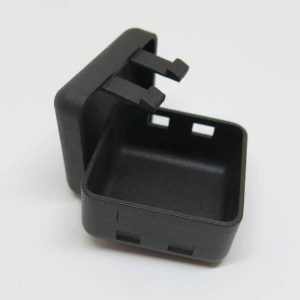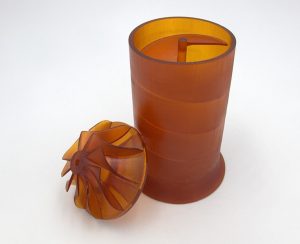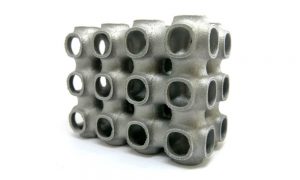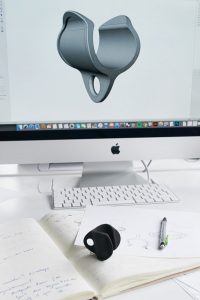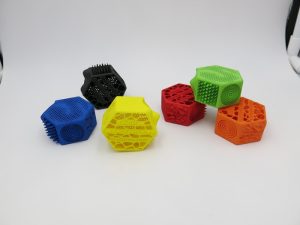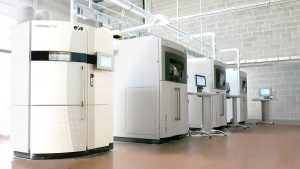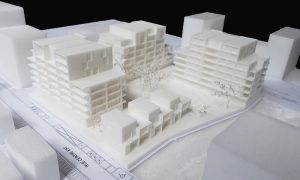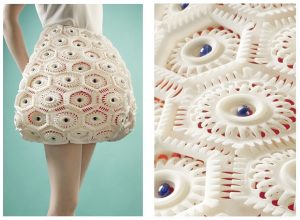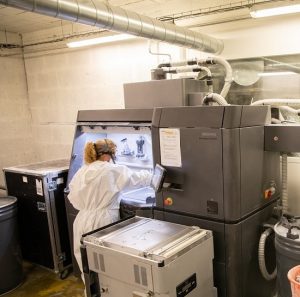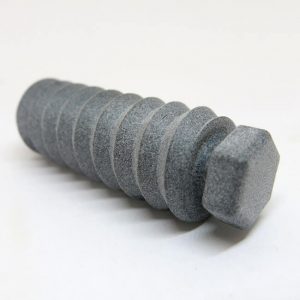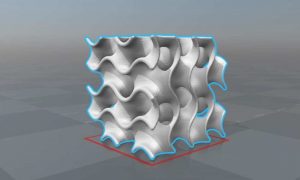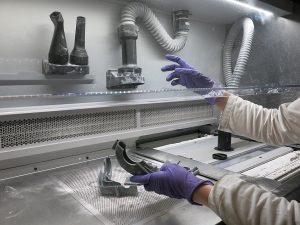Introduction
3D printing, or additive manufacturing, has become, over the years, a reliable manufacturing technique used in all kinds of sectors. But do you really know what is 3D printing, how it works and all its possible applications?
Basics of 3D printing
3D printing is a manufacturing technique, more and more used today to make proofs of concept, prototypes or end-products. Companies are implementing 3D printing at different stages of their manufacturing processes and rethinking their business strategy with this competitive advantage.
Engineers, designers, and even hobbyists are elaborating innovative applications of this cutting-edge technology. 3D printing is a technique which builds objects layer by layer from a 3D file. The process is literally transforming a digital version of an object, into a physical version.
History of 3D printing
There is a real history of 3D printing: additive manufacturing is not a new technique. But do you know what was the first technology ever developed? Stereolithography, or SLA! The first attempts have been made by a French team of engineers composed by Alain Le Méhauté, Olivier de Witte and Jean-Claude André. Because of a lack of a business perspective, the project has been abandoned.
But at the same time, Charles Hull was also interested in the technology and submitted the first patent for SLA in 1986. He founded the 3D Systems Corporation and in 1988, released the SLA-1, their first commercial product.
In the 90s, the main technologies have been developed such as the Fused Deposition Modeling (or FDM) technology and the main actors of the sector also started during this decade.
Since 2000, the evolutions of additive manufacturing are even faster, and new applications are found every year: medical 3D printing, 3D printed cars, mechanical applications of 3D printing. This technology opens new opportunities in every sector. We will see more in detail the applications of 3D printing later in this article.
How does 3D printing work?
There is not one unique way to 3D print. Indeed, when thinking about 3D printing, a lot of people are still thinking about the FDM process. But 3D printing is much more than that. There are actually several possibilities, and technologies to create parts additively. The choice of your 3D printing technology and the material will be determined by your project. What properties do you need? What resistance? Here is how the main 3D printing technologies work.
Plastic 3D printing
or SLS: This 3D printing technique creates objects by sintering the powder inside the printer, using a laser. During this layer by layer process, the powder bed is preheated and a laser sinters the powder according to the 3D model to create the solid object.
or FDM: This 3D printing method is well-known by hobbyists, but also in education. FDM 3D printers are using one or two print heads for the deposition of melted 3D printing material. The material is melted and extruded through a nozzle, to create the desired object each layer at a time. FDM is mostly known for being a plastic 3D printing technique, but it is now possible to use it to print metal materials for example.
Resin 3D printing
: The DLS technology developed by Carbon works by projecting a continuous sequence of UV images, generated by a digital light projector, through an oxygen-permeable, UV-transparent window below a liquid resin bath. The dead zone created above the window maintains a liquid interface below the part. Above the dead zone, the curing part is drawn out of the resin bath.
: This resin 3D printing technology spray layers of curable liquid photopolymer on a build tray. The software calculates the placement of photopolymers and support material during the pre-processing stage. Then, during the printing, the resin 3D printer jets, and instantly UV-cures, tiny droplets of liquid photopolymer.
or SLA: Stereolithography the first 3D printing technique ever created. This resin additive manufacturing process us using photochemical processes. It uses liquid photopolymers that can be cured. The build plate moves down in small increments and the liquid polymer is exposed to light where the UV laser draws a cross-section layer by layer. The process repeats until the object is printed.
Metal 3D printing
, or DMLS: These 3D printers create parts additively thanks to a laser, sintering fine metal powder particles to fuse them together. The process is quite similar to the Selective Laser Sintering process for plastic. The difference is the sintering temperature, much higher for metal printing techniques. Indeed, polyamide needs to be sintered at a temperature of 160°C to 200°C, whereas metal melts at a temperature around between 1510°C and 1600°C meaning that a higher wattage laser is needed to reach that temperature.
, SLM: Unlike DMLS, SLM fully melts the powder, and therefore it needs to reach a higher temperature than this other metal 3D printing technique. The printing process then fuses metal powder particles in a full melting process. Then the process stays the same, a laser comes to sinter the powder and creates a solid object layer by layer.
: This additive manufacturing method also creates metal parts additively. Binder Jetting is a binding agent. This liquid binding agent is deposited on the powder, according to the 3D model to create. The powder is lightly cured for solidification between each layer. When the printing process is complete, the build box is removed from the printer and placed into an oven for curing. After this, the parts are extracted from the build box and the remaining powder is removed thanks to brushes and air blowers.
Color 3D printing
: This technology is creating multicolor parts! Just like other processes, Colorjet technology prints out the object layer by layer. A rolling batch leaves a uniform layer of the sandstone-like powder and then, two printing heads pass over this batch, coloring and adhering to the object at the same time.
How to select the right 3D printing technology?
All 3D printing processes have their own advantages and limitations. All industries and all projects have different requirements and the nature of your project will help you determine which process and which material will be perfectly adapted to your 3D printing idea. Choosing the right 3D printing process and material will participate in the success of your 3D printing experience. The mechanical properties of your object will depend on the mechanical properties of the material you chose to 3D print.
Do you need a flexible or rubber-like material? A heat resistant material? Do you need to find the cheapest material for your prototypes, or do you need to get the most detailed parts to create your end product? The possibilities are endless, but once you’ve found the perfect process for you, be sure to check the design guidelines of the materials and process, to make the most of the additive manufacturing process and get all the interesting properties of the 3D printing material.
What are the materials used in 3D printing?
Speaking of materials, do you know what materials are used in 3D printing? From strong plastics to light metals, additive manufacturing is now able to create your parts using a wide variety of materials. As we just saw with 3D printing technologies, the most used materials are plastics (with materials such as Nylon PA12, PEBA, Alumide, etc.), resins (with materials such as VeroClear, VeroWhite, Elastomeric Polyurethane, etc.) and metals (with materials such as Aluminum, Titanium, Stainless Steel, Brass, Bronze, Silver, etc.). But you will have to check the mechanical properties, advantages and design guidelines of these materials to make your final choice and get the best 3D printed parts for your project.
Now more and more materials can be 3D printable, even the most improbable ones. It is now possible to 3D print concrete or even human tissues. Additive manufacturing technology is evolving and improving quite quickly, researchers keep on pushing the boundaries of this amazing technology to develop new incredible applications, showing year after year that everything is 3D printable.
Advantages of 3D printing
The advantages of 3D printing are numerous, and more importantly, they are different for each sector or application! While implementing this technology in your business, you’ll have to correctly identify your opportunities, to make the most of additive manufacturing and all its advantages for you. Let’s see what are the main benefits of 3D printing.
Get faster product development and prototyping
Additive manufacturing is known to be an efficient prototyping technique, but do you know why? 3D printing is faster than traditional manufacturing techniques to create a proof of concept or a prototype.
Indeed, it is possible to make iterations quickly thanks to this process: You print a version, and it is then possible to modify your 3D file directly on your 3D modeling software and then print a new iteration to see if the result meets your requirement. If not, making a new version will not take you more time. Additive manufacturing allows rapid prototyping!
Moreover, this whole process will be cheaper using additive manufacturing. For example, using raw Multi Jet Fusion PA12 will be the cheapest option you will find on Sculpteo’s website.
Working on better designs and products
3D printing allows for creating products with better design, meaning products can be totally optimized thanks to 3D printing. But how is it even possible? Additive manufacturing can be used to improve existing objects. Using this layer-by-layer technique is a way to manufacture objects in one part, and for some projects, a way to avoid the assembly process. Thanks to that: structures impossible to create with traditional manufacturing techniques can be easily achieved by using this 3D technique.
What are the possible improvements that can be made on a product thanks to additive manufacturing? For example, 3D printing is offering the possibility to get a lighter product by hollowing it. But it is also possible to get it stronger, or stronger and lighter at the same time by working on different structures, such as lattice structures. This specific design feature forms a network of crosshatch sections that strengthen the whole structure. Lattice structures are more than an ornamental feature since they give your final object a reinforced and optimized structure.
Using 3D printing as a production process
Additive manufacturing is more and more used for production, and not only for prototyping. The quality of the parts coming out of 3D printers are now similar to parts created with injection molding! By using resin 3D printing, for example, you will be able to reach a high level of detail, technologies such as DLS, or Multi Jet Fusion technology for plastic parts.
Mass-customization made easier
Mass customization is a great advantage of additive manufacturing. Creating custom-made products is easier, faster and cheaper. Moreover, mass-customization can be an asset in various fields, such as the medical sector, as we will focus on a little bit later.
3D printing offers the possibility to get different versions of the same product and get parts more adapted for each person each time: it can be an asset for fashion, glasses, medical, etc.
Make the most of a great competitive advantage
Implementing 3D printing in your business can represent a significant competitive advantage. If your competitors are not using additive manufacturing yet, you could really start to improve your business strategy and make the most of the advantages they are not able to reach yet.
Each year, in our State of 3D Printing, more than 90% of the respondents to our survey consider that 3D printing is a competitive advantage for them. And what about you?
Improve your tooling process
If we often think about additive manufacturing to create prototypes of end products, this technology can actually help you improve your tooling process. 3D printed tools are actually becoming more and more popular for car manufacturers!
This is a great way to get totally adapted tools, implementing additive manufacturing inside your tooling process is allowing you to save time and money.
Rethink your supply chain
Your storage and supply chain can be totally changed and improved thanks to additive manufacturing. Using additive manufacturing, you will have the opportunity to manufacture your parts exactly when you need them, meaning you don’t have to deal with a warehouse and inventory. You can rethink this process and get a digital inventory by creating parts on-demand.
3D printing is not that expensive
You might wonder, how much does it cost to 3D print? This manufacturing technique is more and more democratized, this is why it is now quite affordable to 3D print for your prototyping or production process.
It will depend on the technology you need to use for your project. A desktop 3D printer can be affordable. But if you need to produce parts using SLS technology, for example then it might be expensive, especially if you are a small business. But this doesn’t mean that you can’t use an industrial 3D printer! You can start to make the most of a 3D printing service such as Sculpteo to order your parts, using all professional 3D printing technologies you want, without buying 3D printers.
If you want to know how much your 3D printing project will cost, you can get an instant quote on our website by uploading your 3D file. The price of your part will depend on different factors such as the choice of technology, material, the volume of your part, the amount of material needed, etc.
3D printing applications
3D printing can be used by all kinds of industries, and for really different applications. Here is an overview of what 3D printing can do for you:
Automotive 3D printing
Additive manufacturing is more and more used in the automotive sector. 3D printing to make car parts is really convenient, especially for classic cars, with parts that are no longer produced. It is also becoming a way to rethink the structure of cars to make them lighter and improve their performances and creating more eco-friendly car models. 3D printing is now able to produce technical parts for the automotive sector, and the fully 3D printed car will become a reality in the upcoming years.
Medical 3D printing
Medical 3D printing is now becoming a common application of this technology! From implants to custom-made prosthetics, additive manufacturing is offering plenty of great advantages to the medical sector. Surgeons can also get 3D printed models to train before their surgeries, these 3D printed organs can be really useful and help save time and money. Surgeons are also using additive manufacturing to create tools entirely fitting their needs!
3D printing for architecture
Additive manufacturing can be used in the construction sector to give life to mockups and get a better visualization of your projects for you and your potential customers. This is an efficient solution to materialize your ideas.
3D printing for education
3D is the perfect solution to give life to the concept and allow everyone to manipulate complex ideas with physical objects. Additive manufacturing is helping to make the learning process easier, from primary education to university. Using this technology, students can print mechanical parts, architectural mockups, art or even prototypes!
3D printing for tooling
We already saw that 3D printing was an efficient technique to improve the tooling process of car manufacturers. But reducing tooling investment can be beneficial for any business and you should definitely start to think about it.
3D printing for robotics
Create rapid prototypes thanks to 3D printing to get parts fitting your robot project. This technique is perfect to get the perfect design for your project, with lighter parts and reduced assembly time. The large offer of 3D printing materials creates the possibility to get robotics parts with incredible mechanical properties. Moreover, it is also convenient to produce unique and specific parts with great freedom of design.
3D printing for aeronautics and aerospace
Engineers are clearly making the most of 3D printing to create technical parts for aeronautics and aerospace. With the quick development of metal 3D printing, sectors such as Aeronautics and aerospace are two sectors where parts manufactured have to be heat resistant and robust, and with the great strength to weight ratio offered by this technology, these sectors are starting to use this technology really seriously. Tools, fixtures, aviation parts, everything can be 3D printed!
3D printing for fashion
Fashion and 3D printing are opening new possibilities. Indeed, designers are quite used to additive manufacturing, they use it to create artistic pieces for fashion shows. But this technology tends to be more used to manufacture traditional clothes, but also shoes. What are the advantages of this manufacturing technique for fashion? Mass-customization, complete freedom of design, and access to materials with great mechanical properties!
What are the differences between 3D printing and traditional manufacturing?
Additive manufacturing is now a real alternative to traditional manufacturing techniques. Using 3D printers, CNC machines, injection molding or casting are all reliable manufacturing methods, with different advantages. 3D printing presents a lot of advantages and opens new possibilities. But what are the differences between 3D printing and traditional manufacturing? Injection molding vs 3D printing, metal casting vs 3D printing: Why is 3D printing a real alternative to these manufacturing techniques? While starting a project, you will have to identify the needs of your project to select the perfect manufacturing technique. As we saw a bit earlier, additive manufacturing presents numerous advantages, compared to other technologies.
The additive process allows to create parts with complex geometries, impossible to manufacture with traditional manufacturing techniques. 3D technology offers impressive geometric flexibility. Mass customization is also easier with additive manufacturing, it is possible to modify your 3D file quite easily and print new iterations with the required modifications.
For small volumes, 3D printing will be the most efficient and low-cost solution you will find, which is particularly useful when you are developing prototypes or starting to manufacture small batches. Additive manufacturing is a really interesting solution for small business! No need to create a mold to produce a few parts. You can print 1, 100, or 10K parts with only a few clicks on an online 3D printing service such as Sculpteo.
It will depend on the nature of your project, but additive manufacturing is not necessarily the best option for a larger production. Additive Manufacturing doesn’t necessarily have to be a competitor to traditional metal casting. It can very well complement classical methods of production and improve them!
Using a mix of traditional manufacturing and additive manufacturing techniques might be the perfect solution to benefit from these techniques. For example, if you are wondering how to use both metal 3D printing and metal casting, additive manufacturing and classical foundry is used to 3D print the replicas of the master objects. 3D printing allows a high level of details which was not reachable before the use of Additive Manufacturing methods.
Last but not least, as it is an additive technique, 3D printing is allowing to avoid material waste. Indeed, if injection molding was first seen as a manufacturing technique producing low scrap, compared to processes like CNC machining, it appears that the winner in this category is the 3D printing technology!
How to get started with 3D printing?
To get started with 3D printing, you will have to first identify your 3D printing opportunities. Is additive manufacturing a great asset for your tooling process? Is it a chance for you to boost your Kickstarter campaign by developing the perfect proof of concept or prototyping to attract backers? Additive manufacturing can also be a great asset for your production, or to create custom-made objects.
There is no doubt, all businesses can improve their strategy by using additive manufacturing and make the most of this incredible competitive advantage. Don’t wait for your competitors to take a step ahead of you. If you need some help to identify your opportunities, contact our 3D printing experts from Sculpteo Studio.
Get your 3D file!
Once your project is clearly identified, you will have to create your 3D model and get an STL file. STL is the most common file format to 3D print, but there are some other file formats you can use. An STL file stores information about your 3D model. The format represents the raw surface of a model with small triangles. The more complex and detailed the structure is, the more triangles will be used to represent the model.
For this, you will have to choose a 3D modeling software adapted to your project. For example, if you need an engineering mechanical software, you will use programs such as Solid Edge, or Fusion 360, if you need architecture 3D software, you will use ArchiCAD, or Revit. Free CAD software can also be the perfect solution to develop your 3D design and get your STL file. Here is another solution if you don’t want to start a design process, you can buy a 3D model on a database, or on a software library.
How to design for 3D printing?
These 3D programs can be advanced and difficult to use. But even if you know how to use a 3D modeling software it doesn’t mean that you are able to create a 3D model.
In order to get the best result with your 3D printed parts, you will have to respect the design guidelines of the materials and technologies you chose for your project. Not respecting these design guidelines is the main reason for 3D printing problems, this is what could make your file non-printable, or create a defective part. To make the most of the material you chose and get all the mechanical properties of this material, you will need to create a good 3D design.
You will have to be careful with your wall thicknesses, your face orientations, and you will have to avoid crossed volumes so the 3D printer understands correctly what it has to print. You will also have to be careful with non-manifold models: Open objects with edges that are not totally connected or objects with added faces are part of the most common errors while using 3D printing!
How to 3D print your model?
Once your model is ready, you can 3D print it! You can print it with your own 3D printers. If you have a 3D machine, it is certainly a desktop FDM 3D printer, but have you ever tried industrial 3D printing?
If you don’t want to invest in an industrial 3D printer but access professional quality, you can send your file on a 3D printing service such as Sculpteo, you will just have to choose among +75 possibilities of materials and finishing options, and you will get a free instant quote. Industrial Additive Manufacturing is for anyone who’s production requirements are strength, good quality, and great mechanical properties.
What is the future of the 3D printing industry?
With our annual study about the industry of additive manufacturing, The State of 3D Printing, we see the evolution of the uses of this technology. Businesses are confident in their use of technology. Businesses are investing more and more money each year to implement this additive technology at different levels of their company. From R&D to production, and tooling, 3D printing now plays a significant role in a manufacturing and business context.
The future of additive manufacturing is promising. It continues to be the best prototyping technique but also becomes a reliable production method. If mass production still has to be improved, strong brands such as Adidas are starting to prove that it’s not impossible and could be the future of mass production.
In certain sectors such as medical 3D printing, the evolution of additive manufacturing also means saving more lives, creating more life-changing devices, and helping surgeons to be even more efficient.
The evolution of additive manufacturing will not stop there, and new applications will be found in the upcoming years to continue this manufacturing revolution. Join the innovation and start to 3D print now!
